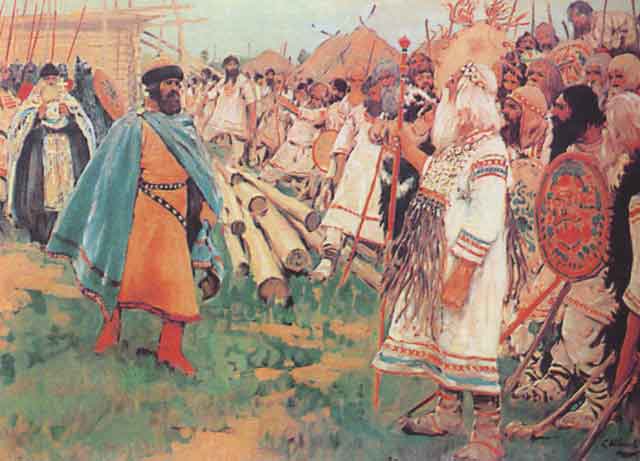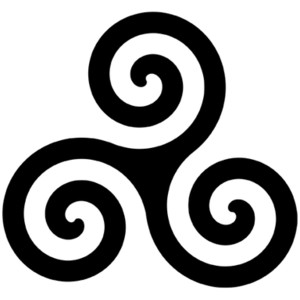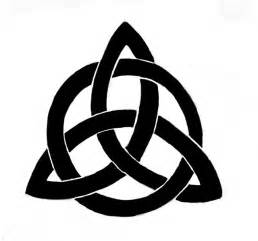
This issue in particular has come to my attention among those who wish to revive our native folk spirit and once again see our civilization flourish. There are those who feel that it is most important to acknowledge our Christian heritage as a source of strength, and that this is the only way to rally our people to defend our lands. Others see Christianity as having caused the problems of multiculturalism and environmental devastation in the first place, and that only by returning to our pagan past can we see a true revival among our folk. This issue is not as clear-cut as it sounds, and it is quite frustrating to see Europeans bickering amongst each other over matters of religion while the enemies are at the gates. I wish to give a broader analysis of the situation, and will attempt to explain why it is not an issue of which religion is the ‘true’ one, but rather which one is appropriate for the present situation.
First of all, I will address some of the concerns of pagans who have an issue with Judeo-Christianity and see it as the source of our woes and wish to abandon its tenets in favour of the ways of our ancestors. As this is the camp which I fall into as a Wotanist first and foremost, I can sympathize with such concerns. The abuses by the Church against our folk for the sake of profit by promoting high-minded ideals while indulging in the very things that they preach against (such as adultery, pleasurable sex and attachment to material possessions) has sickened many people to their stomachs, severing their trust in organized religion and even the idea of ‘God’ itself. I too held this view of Christianity for many years even before becoming a pagan and it is because of this hypocrisy that paganism has seen a revival in recent decades. Christianity has become a part of all of our institutions, even though in Britain (and especially in Scotland) it has largely taken a vestigial role. Though this may be the case, it still looms large as part of our cultural fabric, and it is difficult to escape its presence.
However, as I have explained before, ‘Judeo-Christianity’ is a specific form of Christianity, it is not a particular sect or offshoot, but rather a method of employing religion as a way of practising capitalism. It involves the deception of believers into giving their money to the Church, not because they provide an actual service in the form of offering tips on achieving connection with God through the self, but in order to bolster its authority and capital in order to maintain its control over the parishes. Judeo-Christianity was promulgated by Paul the Pharisee as a way of merging the Judaic religious hierarchy with the teachings of Christ that were intended for gentiles. This religious structure was adopted by the Roman emperor, Constantine, who used it to secure his hold on the Roman Empire, by emphasizing the monotheism of Christianity in order to legitimize his own rule as ‘God’s regent’ on Earth. This tactic was later employed by Medieval kings as a way to consolidate their power.
One can be a Christian without being either complicit in or fooled by this tactic. If one knows how to interpret the teachings of Christ correctly and not to take them literally, then you have already raised yourself above the level of what the Church expects its followers to be, which is sheep. This path is known as ‘Kristianism’, and involves discovering esoteric knowledge through personal study of the Bible. There are also simply’ Cultural Christians’, who adopt Christianity as merely a cultural garb and to whom the corruption of the Church is known, but who also know their local clergy well enough that they can trust them and for whom engagement in Christianity fills both social and spiritual needs. This is particularly relevant to those following Catholicism, which has incorporated Pre-Christian practises in order to convert pagans in the past. The result is now that it is essentially a syncretic religion that has more relevance today than any attempt to revive the original paganism, as this is the form in which those traditions have survived.
As to the concerns of Christians with regards to the resurgence of paganism, I must say that many of their fears about this are misplaced. There are some who see such a phenomenon as ‘the devil’s lure’ and conflate the return of paganism with the proliferation of Cultural Marxism and other Modern ills. For this reason, paganism is seen as a threat rather than an ally, and the Christian heritage of the West is emphasized, particularly the Renaissance. I would disagree with some pagans that the Renaissance was more pagan than Christian, it seems to have been a mixture of both. For this reason, I do find it rather annoying that some Christians see paganism on the same level as Islam, and are not willing to work with pagans because their religious beliefs prohibit this.
This may prove to be an especially dangerous move on the part of the Christians, as the fact that Judeo-Christianity and Sunni Islam fall under the Abrahamic umbrella may be used by the powers that be as a way to turn both forces against us pagans, reviving the Burning Times and securing the control of the Church and other various Abrahamic institutions. While I do not think this is likely, it would be the result of a reluctance for Christians to cooperate with pagans, a scenario which is also not helped by the attitude of some pagans, who also refuse to work with Christians because they cannot see any merit in Christian teachings as they conflate this with Judeo-Christianity. Simply saying to a Christian “all of the good parts of your religion are stolen from paganism” is not going to win you any friends, and this will only result in confirming their perception of us pagans as brainless barbarians who are unable to reconcile the cultural contributions of Christianity with their own heritage. Christians would also do well to remember that their religion is indeed in decline, and that it would be wise to ensure their survival through working with emerging faiths, as opposed to sealing their fate to the history books by lashing out in the same way as Islam.
And now I wish to move onto my final point, which is that different types of religion are appropriate for different periods in history. To illustrate this, I will reference a symbol which can be appreciated by both pagans and Christians alike, the Trinity. The Trinity can be expressed in a variety of artistic forms, from the triskele (triple spiral) of Celtic paganism, the valknut (triple triangles) of the Teutons, or the triquetra of Celtic Christianity. The Trinity is taken in a theological sense to signify the Son, Father and Holy Spirit within Christianity (as aspects of God) or as three gods or three goddesses within paganism (such as Wotan, Thor and Tyr in Teutonic paganism, or as Morrigan, Badbh and Macha in Ancient Ireland). In a metaphorical sense it has many meanings, but one of the main principles of the Trinity within Aryan philosophy is that of representing arising, being and passing away; in other words, birth, life and death. This is taken to reflect the cycles of life and applies to all forces within Nature, such as creation, sustenance and destruction. They are also reflected in the gunas or ‘energies’ in Hinduism, which are rajas (generation, passion, building), sattva (goodness, stability, peace) and tamas (darkness, ignorance, degeneracy).

Triskele

Valknut

Triquetra
And so, how does this all relate to which religion will enable our people to find their inner strength? Well, in one sense, each person is suited to a particular path; whichever one calls each individual should be their own guiding light, and this is for no one else to interfere with. However, it is clear that civilizations go through these same cycles found in Nature, and so one type of religion will be more appropriate for each stage in an epoch. These three types of religion have mainly to do with interpretations, which take the form of either paganism, mysticism or fundamentalism. Essentially , the difference in attitude between these three belief systems is that, for pagans, their general philosophy is “I must take care of myself and my kin”, for mystics, it is “I must take care of others before myself” and for religious fundamentalists and materialists, it is “others must take care of me before themselves”. However, I find it necessary to explore the differences between these approaches in more detail and compare their varying attitudes and attributes.
First of all, ‘paganism’, in a true sense, refers to a religion or culture that is embodied by rajas; for which the main focus will be fertility and procreation, art and literature, mutual exchange, war and conquest, animal sacrifice, fortune-telling, magic and folklore. Paganism is often polytheistic, emphasizing the importance of multiple deities (also known as ‘archangels’ in Abrahamic mythology) and their interaction with each other and with each individual human. The gods represent seven archetypes (and are further subdivided into different characters in mythology) and they act as role models for an individual to both relate to and embody, and can be called upon for various desires, if the favour is returned in the form of an offering or sacrifice. Paganism tends to be a communitarian religion, and the relationship with one’s ancestors is seen as one of the most important facets of one’s life. Paganism embodies all that is practical, creative and sensual. The pagan religions consist of what are considered ‘native religions’, which are folkish belief systems specific to each culture and people. Their membership is therefore restricted to each ethnicity from which these religions emerge, since power is gained from one’s ancestors which one does not share with the rest of humanity.
In contrast to this are the mystical religions, which include Kristianism, Buddhism, Sufism, Zoroastrianism, Sikhism and the various mystery religions of history. In Hinduism, this takes the form of devotion to Krishna (another name for Christ) and is associated with the mode of sattva; and so adherents to mysticism value modesty, chastity, humility, charity, making plant offerings and practising meditation and fasting as a means of attaining peace. The focus of mysticism is for each individual to follow their own path to enlightenment, and so this applies to all of humanity and is therefore universalist. Mysticism tends to be either panentheistic (“God exists in all things”) or monistic (“all is one”).
Mystical teachings encourage connection between oneself and the universe, and so this involves seeing all other plants, animals and humans as part of one self, which exists as a singular entity in union with God (or ‘creative force’). This path is personal and is usually pursued on an individual basis, and so it involves the study of esoterica. Groups are formed by those who share such beliefs, but the main emphasis is on a deep, personal connection with one’s surroundings in order to attain peace, which is why monasticism and Hermeticism (a ‘hermit’ is somebody who follows the ‘Hermetic’ or ‘wisdom’ teachings) is so popular among such people. Those who follow the mystic teachings exemplify grace, unity and purity.
The third type of belief system in this context is religious fundamentalism. Such religions consist of what are known as ‘Orthodox’ interpretations of scripture, and include Judeo-Christianity, mainstream Sunni and Shi’a Islam, Orthodox Judaism and various death cults that have existed throughout history; including the thugee of India, who drugged and captured travellers and sacrificed them in the name of the goddess Kali. Religious fundamentalism requires a literal interpretation of mythology, and so being in the mode of tamas, encourages deception, coercion, enslavement, humiliation, violence, bigotry, hatred, perversion, human sacrifice and demonolatry (‘demon worship’). It is worth clarifying that ‘war’ in a pagan sense is quite apart from ‘violence’ within fundamentalism.
While warfare is seen by pagans as a necessary act as a means of gaining honour in battle with other combatants, religious fundamentalists will typically resort to attacking the weakest targets, such as women and children, and by employing trickery to gain sympathy while they commit crimes against others. Religious fundamentalists tend to be either monotheistic (“one god is the only true God”) or atheistic (“there is no God”) and will appear in the form of any religion (including paganism), as their intent is to subvert religious doctrine to suit their own needs. Though they desire to attract more adherents, religious fundamentalists will typically shun anyone who does not follow their specific dogma and are usually hostile to those outside their own faith, particularly pagans. Fundamentalist leaders demand conformity and obedience from their followers.
Though usually associated more with politics, it may also be said that Marxism is a type of religious fundamentalism; the only difference being that, instead of committing atrocities in the name of ‘God’, they do so in the name of ‘humanity’. Their human sacrifices are those who stand in the way of their pursuit of ‘progress’. In essence, any interpretation that takes some statement literally (such as ‘all humans are equal’ or ‘God will punish those who disobey’) comes from a place of ignorance and can be seen as contributing to the destructive forces of the universe.
While some (usually mystics or fundamentalists) tend to see such interactions in the form of ‘good versus evil’, as a pagan I do not believe in such concepts. Rather, each of these forces form a necessary part of struggle in life, and must be relegated accordingly to each situation in which they are appropriate. Unfortunately, for those who wish for there to be no negative interpretations of religion, this in itself is a form of ignorance, as such practices will always exist among humans, and it is up for each individual to choose the path for which they are best suited. If there were none who embodied the destructive and chaotic aspects of reality, how could we compare their behaviour in contrast to nobility or goodness? It is more a matter of management than eradication, as the belief that we can erase evil from our world is as foolish as it is undesirable.
Which brings me to my conclusion with regards to which religion will meet the needs of the time in which we find ourselves. As I said before, each type of religion will be for each person to choose, and so no one can be blamed for feeling the call to a path that is not the one in vogue at a particular time. However, as for the collective, it is clear that one approach will suit each time period to reflect the state of our civilization. It is apparent that we have been living in an age of decay, and the tamas energy has been reflected the Death of the West. The proliferation of Marxism alongside Christian and Islamic fundamentalism have been the signs that materialism has dominated and accompanied the destruction of the environment, our societies and ourselves. However, it appears that we are moving into a new age, where the energy of rajas will likely become dominant, and that this can be shown by the resurgence of native faiths across the world.
My feelings are that this is a part of the struggles that we are facing today, our folk and our civilization is being reborn. However, it is a painful process, but one which cannot be held back by the hangovers of the previous age. We have experienced this before; after the fall of the Roman Empire, Europe experienced the gradual conversion to Christianity. However, before the Late Middle Ages, most of Europe was still pagan, even if Christian in name, and the nations that were born in this period (France, Spain, Italy, Germany, England, Scotland, Wales etc.) are those which exist today. By the Late Medieval and Renaissance period, Western civilization was at its peak, and Hermeticism was proliferated throughout Europe by means of widespread literacy. The Catholic and Orthodox Churches had also secured their hold on our lands, but for most this was an opportunity to experience unity with their fellow Christians. However, with the tumult of the Burning Times, this period gave way to the Modern period, in which liberalism and secularism became dominant, and the Western nations began to build empires in order to feed the ravenous hunger of the central banks from which the kings of Europe had borrowed money to pay for armies and secure their political power.
And so, the last century has been characterized by the fall of the European empires, the spread of Marxism and consumerism, the invasion by foreign peoples and the decline of our societies. This means that the cycle will begin anew, and this means that it is paganism, not Christianity, that will lead us into a new era. I do not say this based on my own bias, but rather because this is simply a recognition of the rhythms of the universe and what will be essential in order to face the challenge of rebuilding our civilization. Christian teachings of charity and pacifism are ill-suited to repelling invaders and meeting the basic needs of survival, something which concerns paganism much more closely.
Of course, Christians will not simply go away, even if their numbers are falling. They are still important to our sense of history and heritage, as they preserve that element which is sustainable, and they may carry a tradition that extends beyond the borders of our own folk. There will come a time when the generative force of paganism is no longer relevant, at which point Christianity (or whatever form European mysticism takes in the future) will be necessary in order to maintain what we have built. After those teachings fail to reach enough people through corruption, they will be twisted into literal interpretations for the sake of greed, and so civilization will once again fall and the cycle begins anew. We are at the beginning of an exciting new dawn, as we not only have the traditions of our ancestors which have survived the ravages of time, but also the shared knowledge and technology that characterizes the world in which we live. Strength and honour shall be the order of the day!
Hail Wotan!
Wulf Willelmson


Christianity, Islam are Judaism and it is the enemy that is already deeply inside the Society. Thats also the reason why the judeochristian govs bring the radical Moslems here to islamize. They work together, their Goal destruction of the world all peoples and all life. Russia is also radical christian. Most People are naive and under so called pagans are mostly judeochristian traitors of secret orders that destroyed the folk and culture and are now taking care that it is no established again. http://echterevolution.wordpress.com
LikeLike